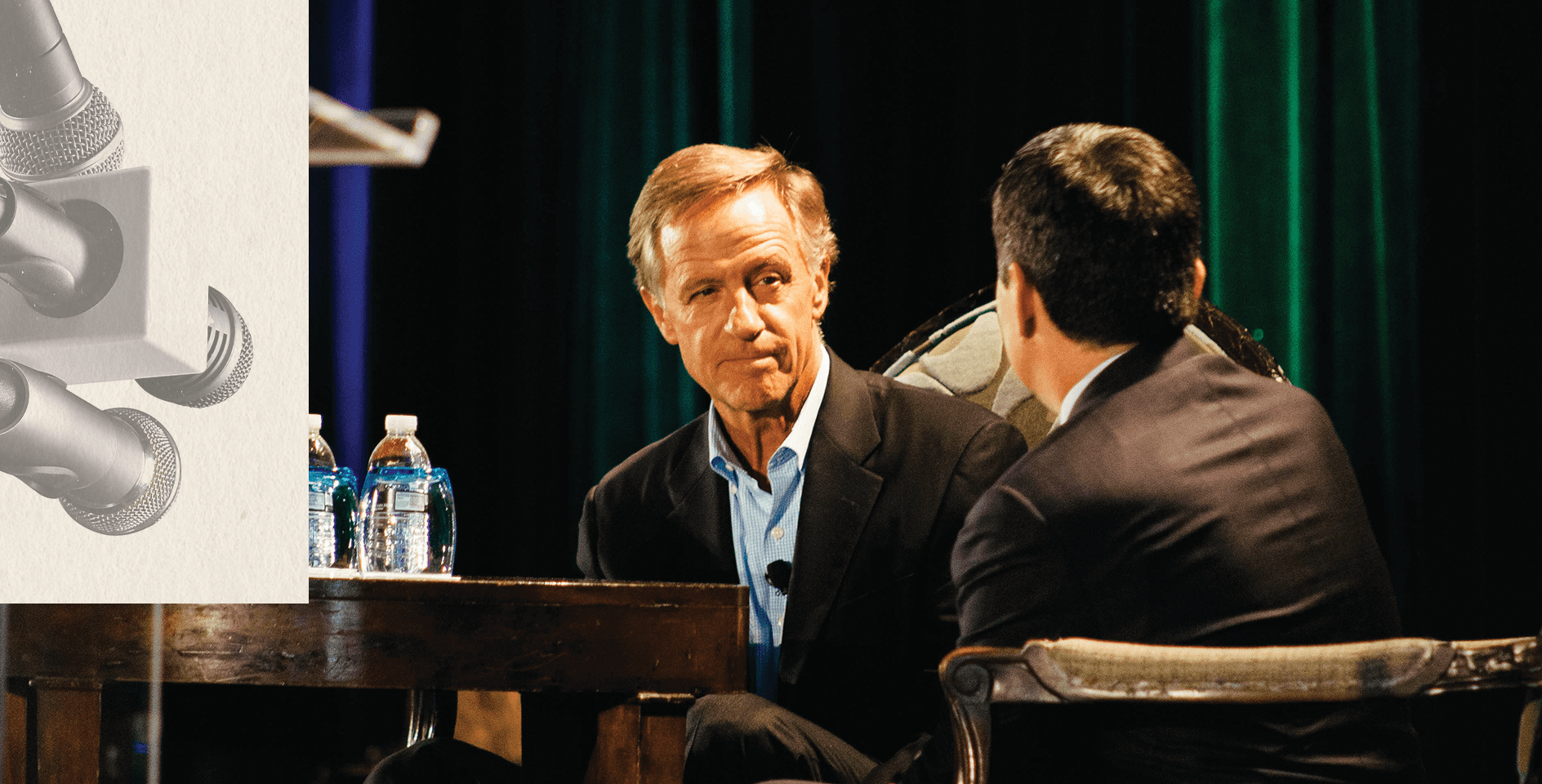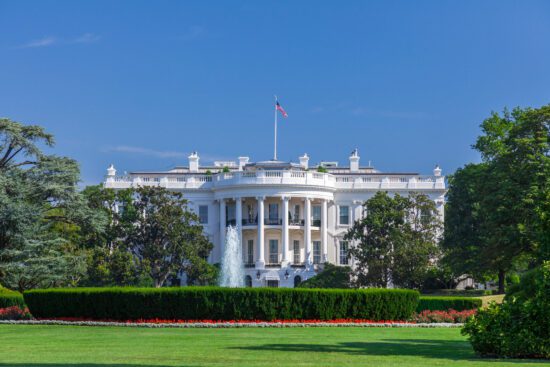As the public policy arm of the Southern Baptist Convention, the ERLC engages a number of elected officials across the country. Tennessee Gov. Bill Haslam is one of those leaders the ERLC has been privileged to work with over the years. During his two terms as Tennessee’s governor, Haslam presided over significant moments for religious liberty, ushered in protections for people of conscience, and conducted himself in a way that should serve as a model for Christians in public service.
Before the end of Haslam’s tenure as governor, Russell Moore had the opportunity to interview him at The Gathering conference in Miami, Florida, to talk about what Haslam has learned about leadership, service, and the current nature of our political climate. With the permission of The Gathering, this interview has been transcribed and lightly edited for clarity and length.
Russell Moore: How do you as a Christian [elected official] deal with navigating that pull toward the approval of people as opposed to finding your identity in Christ?
Bill Haslam: I feel like people know more about you and less about you than ever before if you are in political office because there is information available everywhere. I think one of the advantages of actually having been in office for a while is you get used to that; you get used to people saying things about you that you don’t think are true or you don’t think are fair, and you kind of grow accustomed to that and learn it’s okay. There are going to be some people that don’t like me, and I have to be okay with that.
RM: When you think about your role right now and the life that you have had even before this as a business leader, how do you navigate ambition as a good thing? Sometimes people struggle with that because Jesus tells us whoever will save his life must lose it and yet, they are obviously godly ambitions. How do you personally navigate it?
BH: Think about the verse, “do nothing out of selfishness or empty conceit, but in humility consider others better than yourselves.” How does that translate into an election where you are saying, “I’m the guy. I’m the one that can solve the issue?” I hope the church at large gets a sense that one of the really legitimate ways we are called to serve is in government. Luther said, “Send your ablest not to preach but to government. In preaching, it is the Holy Spirit doing the work, but in government, you are dealing in a world where you have to reason with ambiguity and uncertainty, and so the difficulty is higher. . . .”
If you ever want to find out who you really are, go run for office. People are saying things about you. You are trying to remember why you were running. It is a physically grueling process, but underneath all that has to be this idea that this is what I am called to do. It’s no different than being called to preach or called to lead an insurance agency or anything else.
RM: Everyday is unpredictable and filled with really momentous sorts of decisions. I think there are a lot of people who struggle when they are in the whirlwind of their lives whether in business or a minister, government or whatever. How do you maintain personally a walk with Christ in the middle of all of that?
BH: I would argue that it is no different than anyone. I’d say for me, there are a couple of answers. One, I have to carve out some time to begin the day to pray and to study Scripture. I think the second part is I need people around me who have freedom to speak into my life in strong ways. Until I moved to Nashville, every Friday morning for 30 years, I had the same group of guys come up in my driveway at 6 a.m., and we literally shared our entire lives. When I came to Nashville, one of the first things I did was to seek out a group of guys just like that. I found I need somebody asking me hard questions because I can convince myself of things really easy that aren’t true.
RM: You mention politics as a vocation. One of the things I’ve noticed is that if I’m dealing with a group of older evangelicals, normally what I’m having to hammer is Christ crucified, not generic “God and Country.” When I am dealing with younger evangelicals, I often have to do the exact reverse, which is to say God wants some of you to run the school board, and God wants you specifically engaged. How would you encourage younger people who are kind of skeptical because of the way they’ve seen politics and faith used as a political wedge to be actively involved without losing their souls?
BH: I think that’s a great question for the entire church right now because I do think there are either folks that see politics as the answer—if we can just elect enough people who believe the right things, then our country will end up in the right place—or there are those folks who say I have totally given up, I don’t care, I can’t imagine how that would be relevant.
For the second group I would say this: it is pretty clear how Scripture talks about the role of government. God is not in favor of anarchy. In the state of Tennessee, we have 37,000 employees, a $37 billion dollar budget, and we are like a huge service organization. We help people that want to adopt children. We help those that are addicted to opiates. We run prisons. We educate four-year-olds and Ph.D. students. We build roads. It is our responsibility to provide the very best service that we can at the very lowest cost. I think what has gotten lost in this idea is that people say politics is about where you are on pro-life issues or how you feel about marriage, but it is really about providing service to folks that they can’t get from somewhere else, in most cases.
RM: Cynicism is one of the things that worries me most right now, especially among younger evangelicals because they have seen people who care about a political agenda and partisanship—and Jesus is sort of the way to get there. What you have managed to do, which is sadly rare, is to be able to be a committed Christian who is in the political arena, but no one senses that you are somehow claiming Jesus as your brand in order to advance. How would you advise someone who is a Christian that wants to be in the public arena?
BH: The temptation is to use God instead of being used by God. So, it comes back to that sense of being called. I [try to] remember, if we are called, we are not called to be about ourselves; even the Son of Man came not be served but to give his life as a ransom for many. That is the foundation below the call and why the call exists to begin with.
RM: We are living in a time where people often choose a tribe, imbed in that tribe, and then find whatever facts support whatever your group holds to. How do you navigate that reality that we are living in right now, maintaining your personal integrity and what you believe to be true? Have there been times where you have had to sort of make decisions as governor where you thought this is not going to be popular with my people, but it has to be done?
BH: Yes, so, I’ll give you an example. Every context is different everywhere, but several years ago Vanderbilt, which is private and based in Tennessee, set up a deal that they called an “all-comers” policy for all student groups. This meant that every student group had to take whoever wanted to be a part that had equal access. So, if you are in InterVarsity on campus and someone who had different beliefs maybe wanted to be the president, they had to be able to do that. A lot of Christian groups said there are certain things we believe we are not going to give up on, and Vanderbilt said, “You can meet but you just can’t be on campus.”
Our legislature, a fairly conservative legislature, said, “We are not going to let them get away with that; we are going to take away Federal money, or any state money that goes to Vanderbilt because we don’t want them to restrict religious freedom that way.” They passed a bill basically saying that the state will fund Vanderbilt hospital through Medicaid and some other things, but we are going to restrict all state monies to Vanderbilt.
I ended up vetoing the bill, and I had calls from a lot of friends and people I respect saying, “Don’t you understand if Vanderbilt does this, then pretty soon everybody is going to do it, and we are going to lose who we are?” But I also felt like there was another principle: do we really want the state telling private institutions what they can do? Because there will be a day when the shoe is on the other foot. I just felt like that principle is a hard one.
RM: The legislature also passed a bill proclaiming the Bible as the state book, and you vetoed that as well. I bet that’s a hard day.
BH: I did.
“Honey how was your day?”
“I vetoed the Bible.”
And to this day, I still have people say they don’t understand it. But I know this: when we combine state and the church, the church is the one that loses long term. Look at Europe as an example, where the church and state were combined, and now the church is just kind of a semblance of what it should be. So I actually believe that we don’t use the state to establish our Christian belief. That’s not the state’s role.
And so the legislature said, “We are passing it because of historical significance; that’s why it will be the state book.” That’s how they kind of got around the Constitutional question.
I said, “Well that’s fine, but to me that Bible is the inspired Word of God. It is not an historical book full of great stories. And so we are either going to say we are going to ignore the Constitution, or we are going to act like the Bible is something that it is not.” I just didn’t feel like that was a great path.
RM: You know, it is a really bleak time in many ways. I know people will often say, “Well, we’ve had contentions in political environments going all the way back to Thomas Jefferson and Alexander Hamilton.” But something feels different now, both in terms of decorum and norms from political leaders, but also just looking at social media and seeing the ways that people are arguing. People tend to change their positions not because they come to some different conclusion but based upon just whatever their political party or favorite political leaders hold. How do we get out of this? What’s the way forward?
BH: I think the reality is all that has been exacerbated by how we get our news today. Everybody gets to filter and screen their own news, a lot of which no longer comes through an editor because it is coming to you through social media, or you are watching Fox which is giving you one exact set of facts and then CNN doing the other.
The first thing I would say is make certain that you yourself are not setting up filters for how and where you learn the truth. The second is to come back to: 1. electing the right people is not what’s going to save our country; and 2. on the other hand, it is really clear that who we elect matters. As believers, of all people, we should be the ones that can get that balance right, who can understand both the ability that should come from us as believers but also the sense of there is such a thing as truth.
RM: When you think about trying to move from now, to being in elected office, to the next year, what do you see is your calling in this coming crisis?
BH: I’ve been the governor for seven years and eight months. In less than 17 weeks, I lose my job. I have loved being in public office, and if I never get a chance to do it again, I will be really sad. I honestly don’t know what will come next, but I will stay engaged in what I think are some of the bigger policy issues one way or the other. I think it really does matter, and I’d say this to the church at large: We live in a world where people are giving up on institutions, period. They are giving up on government, they are giving up on the church, they are giving up on media. I think the one way we can get folks’ attention back is by literally living out the gospel.
RM: I was talking to someone in political office who talked about his frustration with the church because he said that at his church he is seen as whatever his office is. So he is not able to find the kind of community he needs because everything he does or says is viewed through that lens. So, what do political leaders need from their churches?
BH: The obvious is prayer and encouragement. It is a lonely road because there is always somebody mad at you, and no matter what you say, you tend to hear those voices louder than the people saying, “Hey, you did that well.” So, encouragement and prayer is incredibly important. Also, particularly if it is somebody you actually know, the willingness to step in and say, “Hey, I know this is a hard one; if it helps any here, I’d be more than glad to sit down and talk with you on that.”
I do want to say this: I have an even greater appreciation for the role that believers play in our society since I have been governor. I just see so many who have been instrumental in working for the common good, and I would say don’t stop. I’ll give you an example. Memphis has the first or second highest poverty rate in the country and historic racial issues that, to this day, drive the city. But if you go down there to Memphis, the one thing that really is bringing life to that city is the church.
I can just tell you that whoever is the mayor of your city or the governor of your state, they may or may not have an appreciation for what you are doing, but I will say this: the feet and hands of Christ that you are being in your communities is so, so important. On behalf of all of us that get to do this, thank you, because I can’t imagine what it would be like without the church.
This article originally appeared in Light Magazine.










